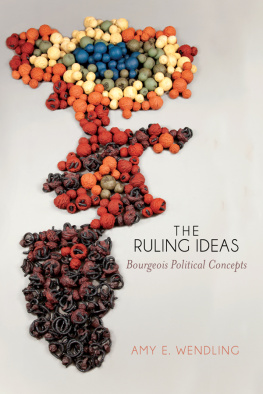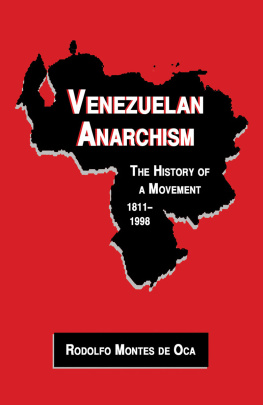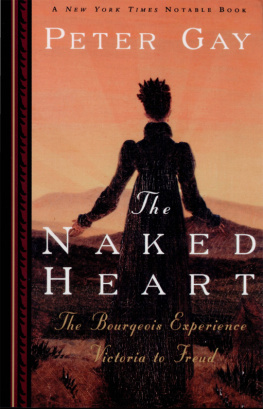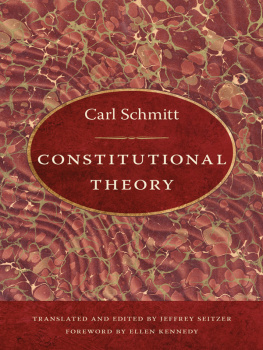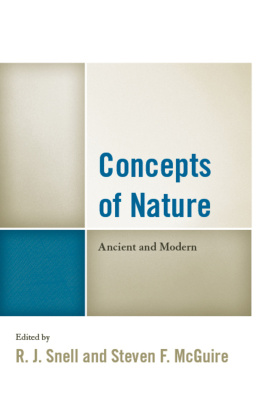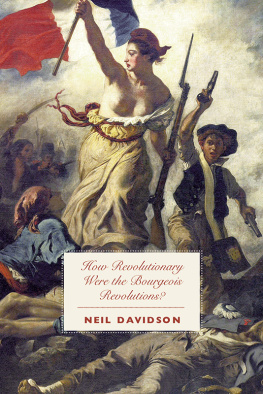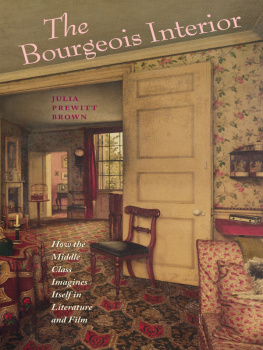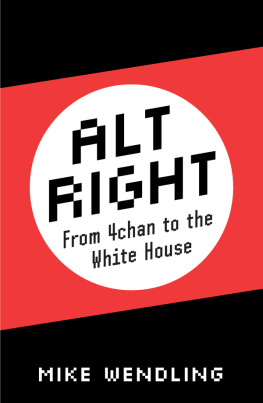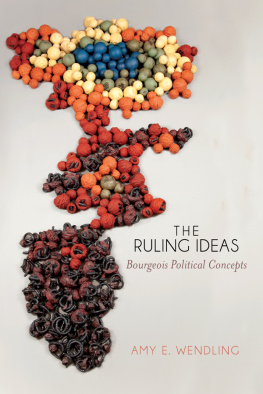Wendling - The ruling ideas: bourgeois political concepts
Here you can read online Wendling - The ruling ideas: bourgeois political concepts full text of the book (entire story) in english for free. Download pdf and epub, get meaning, cover and reviews about this ebook. City: Lanham;Md, year: 2014;2012, publisher: Lexington Books, genre: Romance novel. Description of the work, (preface) as well as reviews are available. Best literature library LitArk.com created for fans of good reading and offers a wide selection of genres:
Romance novel
Science fiction
Adventure
Detective
Science
History
Home and family
Prose
Art
Politics
Computer
Non-fiction
Religion
Business
Children
Humor
Choose a favorite category and find really read worthwhile books. Enjoy immersion in the world of imagination, feel the emotions of the characters or learn something new for yourself, make an fascinating discovery.
- Book:The ruling ideas: bourgeois political concepts
- Author:
- Publisher:Lexington Books
- Genre:
- Year:2014;2012
- City:Lanham;Md
- Rating:3 / 5
- Favourites:Add to favourites
- Your mark:
- 60
- 1
- 2
- 3
- 4
- 5
The ruling ideas: bourgeois political concepts: summary, description and annotation
We offer to read an annotation, description, summary or preface (depends on what the author of the book "The ruling ideas: bourgeois political concepts" wrote himself). If you haven't found the necessary information about the book — write in the comments, we will try to find it.
Wendling: author's other books
Who wrote The ruling ideas: bourgeois political concepts? Find out the surname, the name of the author of the book and a list of all author's works by series.
The ruling ideas: bourgeois political concepts — read online for free the complete book (whole text) full work
Below is the text of the book, divided by pages. System saving the place of the last page read, allows you to conveniently read the book "The ruling ideas: bourgeois political concepts" online for free, without having to search again every time where you left off. Put a bookmark, and you can go to the page where you finished reading at any time.
Font size:
Interval:
Bookmark:
The Ruling Ideas
The Ruling Ideas
Bourgeois Political Concepts
Amy E. Wendling
LEXINGTON BOOKS
Lanham Boulder New York Toronto Plymouth, UK
Published by Lexington Books
A wholly owned subsidiary of The Rowman & Littlefield Publishing Group, Inc.
4501 Forbes Boulevard, Suite 200, Lanham, Maryland 20706
www.rowman.com
10 Thornbury Road, Plymouth PL6 7PP, United Kingdom
Copyright 2012 by Lexington Books
All rights reserved. No part of this book may be reproduced in any form or by any electronic or mechanical means, including information storage and retrieval systems, without written permission from the publisher, except by a reviewer who may quote passages in a review.
British Library Cataloguing in Publication Information Available
Library of Congress Cataloging-in-Publication Data
Wendling, Amy E., 1976
The ruling ideas : bourgeois political concepts / Amy E. Wendling.
p. cm.
Includes bibliographical references and index.
ISBN 978-0-7391-6600-0 (hardback) -- ISBN 978-0-7391-6602-4 (electronic)
1. Political science--Economic aspects. 2. Political science--Philosophy. 3. Capitalism--Philosophy. 4. Labor--Philosophy. 5. Right of property--Philosophy. I. Title.
JA77.W45 2012
320.01--dc23
2012021420
 The paper used in this publication meets the minimum requirements of American National Standard for Information Sciences Permanence of Paper for Printed Library Materials, ANSI/NISO Z39.48-1992.
The paper used in this publication meets the minimum requirements of American National Standard for Information Sciences Permanence of Paper for Printed Library Materials, ANSI/NISO Z39.48-1992.
Printed in the United States of America
For Jess
Even though I shall limit myself only to those persons and institutions that have actually either directly worked on this project or offered it financial support, my lists of debts is still very long, and I beg the readers indulgence.
For their help with the books architectonic and introduction in January 2010, in the context of the first annual Jess Benjamin Studio Think Tank, I am grateful to the philosophers Anne Ozar and Leigh Johnson.
For her careful reading and commentary on early drafts of the Labor chapter, I am grateful to Christy Rentmeester. I also thank Jed Donelan, who commentated on the talk at the 2009 eastern division meeting of the American Philosophical Association.
The Time chapter was helped along by Pierre Lamarche, who allowed me access to some of his works in progress on the topic of boredom. It was also helped along by the gift of many books from Marc Linder, whose own work is often cited in the chapter, and by many years worth of conversations with Shannon Winnubst, whose work is also cited. My colleague Bill Stephens reviewed the chapters references to Stoic ideas. Finally, neither the Time nor the Crisis chapters could have been finished without the comments of Creighton Universitys Humanities Research Group, and so thanks go to Greg Zacharias, Bridget Keegan, Jeff Hause, Tracy Leavelle, Heather Fryer, and Geoff Bakewell.
The research on the philosophy of water that appears in the Property chapter would not have been possible without a summer 2011 faculty fellowship from Creighton University, a fellowship that also allowed me to complete the editorial work on the book project, as a whole. At the chapters inception, Dave Ozar helped me think through how to manage the property concept and how to think about it historically. In a much later stage, the Property chapter benefited from the readership of Patrick Borcherss and Patrick Murray. Pat Borchers knowledge of the law helped me to add correct contemporary examples to the chapters jurisprudential considerations. Pat Murrays superb erudition about John Locke, and in particular the connections he is able to draw between Lockes epistemology and his political theory, made my discussion of the figure that much richer, and our shared love of Marx made the exercise of reviewing my work together a real pleasure.
The Value chapter began as a short essay designed to accompany Jess Benjamins Paradox of Value June 2009 ceramic sculpture show at the RNG Gallery in Omaha, Nebraska. Cory Wimberly subsequently invited me to present a longer version of the essay to an interdisciplinary think tank at the University of Texas Pan-American, a think tank whose members included Fuat Firat, Nik Dholakia, Mohammadali Zolfagharian, Romain Laufer, Alladi Venkatesh, Jorge Rocha, and Salvador Trevino. At the end of the Value chapter, I draw on some archival work that I did several years ago at the Karl Marx archives and research centers in Amsterdam and Berlin. For this work I remain indebted to a J. William Fulbright Scholarship that allowed me to spend nine months in Amsterdam in 2003 and 2004, and to the International Dissertation Field Research Fellowship Program, sponsored by the Social Science Research Council in partnership with the American Council of Learned Societies with funding from the Andrew W. Mellon Foundation, for its support of research in both European capitals in 2003 and 2004. In my many subsequent trips to Berlin, I have received scholarly and personal support from Rolf Hecker and his family, for which I am truly grateful.
An earlier version of the Crisis chapter was published as Crisis Theory and the False Desire of Home Ownership in Philosophy Today 55 (2), Copyright 2011 DePaul University, all rights reserved, and is reprinted by kind permission. In addition to the Creighton Humanities Research Group members that I mentioned above, the Crisis chapter also benefitted from the remarks of the Creighton University faculty who attended an early presentation of the work at Wendy Wrights Kenefick Chair in the Humanities Faculty Friday. I could not have completed the chapter without the editorial assistance of Creighton University Honors undergraduate Anthony Schlimgen. Finally, I would not have written it had not Andrew Cutrofello originally suggested that I do so.
The book would not have been possible without the colleagues in the Creighton University philosophy department that I have not yet had occasion to mention, especially Gene Selk, Jeanne Schuler, and Kevin Graham, nor without the loving participation of my family and personal friends: Nancy Wendling and Steven Benyshek; Sarah and Justin Pittenger; Howdy, Linda, and Ralph Benjamin; and Ashley Hall.
Finally, I am grateful to the artist Jess Benjamin, with whom I share both a home and a studio, for many of the books best ideas, and especially for drawing my attention to Adam Smiths paradox of value, to the Ogallala Aquifer, and to many of the issues that are discussed in the Property chapters deliberations on property in water. More generally, I thank Jess for helping me to expand my imagination by using three-dimensional imagery. Contemplating her sculptural expressions of ideas like global drought has changed my thinking and my writing, particularly as I move back and forth between a visual and a written representation of a single idea. This is why I do my most important writing in Jesss studio, which is always a site of creative, controlled chaos.
Jess and I share our home and her studio with two canines, Jack and Mac, and with a cat named Roswell.
All errors are, of course, my own.
The concepts that organize our thinking wield, by virtue of this fact, a great deal of political power. This book looks at five concepts whose dominion has increased, steadily, during the bourgeois period of modernity: labor, time, property, value, and crisis. Following Marx, I call these concepts the ruling ideas (1978b, 489).
In chapter 1, I show how we imagine more and more of our activities as labor. In bourgeois society, an activity has to be marked as labor in order to be considered important and valuable. Some consequences of the rule of labor as an idea include the denigration of activities not conceptualized as labor, the denigrations of persons associated with such activities, and the amplification of alienation that occurs because of the association between labor and suffering.
Next pageFont size:
Interval:
Bookmark:
Similar books «The ruling ideas: bourgeois political concepts»
Look at similar books to The ruling ideas: bourgeois political concepts. We have selected literature similar in name and meaning in the hope of providing readers with more options to find new, interesting, not yet read works.
Discussion, reviews of the book The ruling ideas: bourgeois political concepts and just readers' own opinions. Leave your comments, write what you think about the work, its meaning or the main characters. Specify what exactly you liked and what you didn't like, and why you think so.

